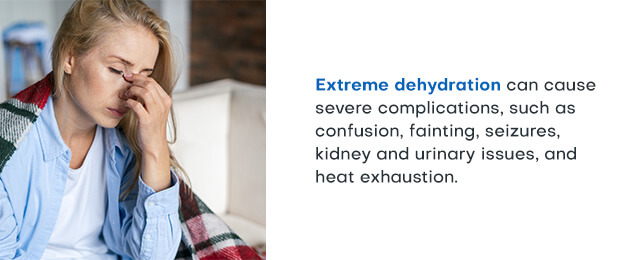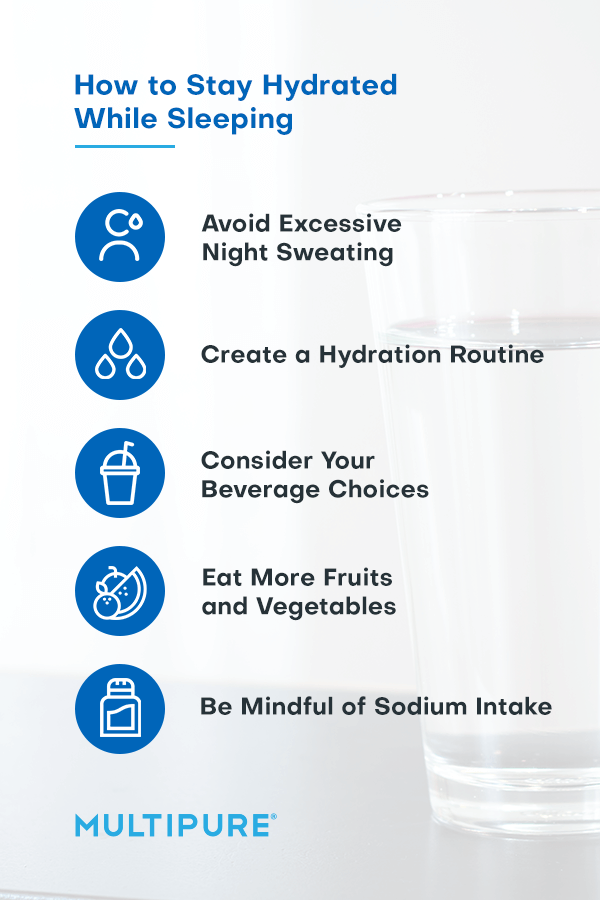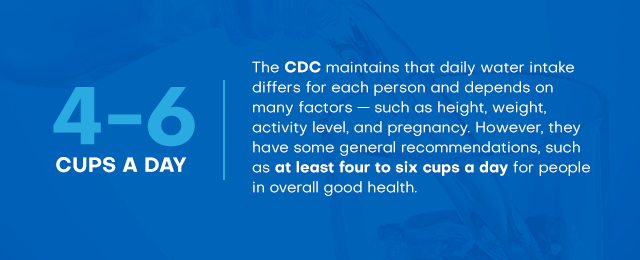The Link Between Hydration and Sleep
Posted by Kenton Jones on Apr 15th 2022
Most people know water and sleep are essential for everyone's health and well-being. But believe it or not, these two aspects of daily life have a distinct correlation. Dehydrated people may have more disrupted sleeping patterns, and those who have trouble sleeping may retain less water. Proper hydration and adequate sleep can reduce health risks and leave you feeling more well-rested.
Finding a balance between these two factors can also help you minimize the number of times you have to visit the bathroom throughout the day and night. With your overall health improved, you may see a change in your mood, energy levels, and other bodily functions. If you struggle with staying hydrated, have trouble sleeping well, or both, consider a few things might be causing these issues.
Why Drink Water When Waking Up?
Many people might feel thirsty or generally dehydrated in the morning or wake up parched during the night. A hormone called vasopressin plays a significant role in sleep and hydration. This hormone is responsible for helping your body retain water and fluids throughout your body. When you don't get enough high-quality, deep sleep, your body struggles to produce and release vasopressin.
You may feel thirsty in the morning because your body can't regulate your fluids or help you avoid dehydration. However, morning dehydration can also result from other causes, such as alcohol consumption and excessive sweat. If you're dehydrated after waking up, drinking a full glass of water to start your day helps your body carry out all its functions properly.
How You Can Lose Water When Sleeping
Aside from not drinking enough water throughout the day, here are some ways your body might be losing water while you sleep at night.
- Sweat: Most people sweat while they sleep. While you are peacefully resting, you may not be aware your room is too warm or your bedding is too heavy, which can cause you to sweat throughout the night. Perspiration also causes your body to lose the water you drank throughout the day.
- Alcohol: Drinking alcohol can lead to dehydration because it is a diuretic that causes you to urinate often. Too much alcohol disrupts your sleep and causes inflammation, along with causing hangovers. Vomiting may accompany these hangovers, further dehydrating you.
- Breathing improperly: If you breathe or snore through your mouth at night, you are more likely to wake up feeling thirsty because the moisture in your nose and mouth slowly evaporates. If you suffer from sleep disorders, waking up dehydrated may be a common occurrence for you.
- Sleep environment: If you sleep in a warm or hot room, your body will produce sweat to cool you down throughout the night, which can leave you feeling dehydrated. Sleeping in a dry room or living in colder, drier climates can make it difficult for you to replenish the fluid and electrolytes you lose throughout the night. However, excessive humidity isn't ideal either, as it prevents your sweat from drying and cooling you off, and can leave you feeling parched.
- Medical conditions: Excessive water loss from the kidneys due to renal disease, hyperglycemia, and diabetes may also increase dehydration and cause you to feel parched. These conditions also make your body's processes, such as kidney filtration, work harder and can increase urination frequency.
How Lack of Sleep Can Lead to Dehydration
There's a close link between shorter sleep durations and inadequate hydration. This study also discusses the importance of vasopressin in regulating bodily fluids, which get released during deep sleep cycles. When you are sleep-deprived or wake up too early, your body may not produce or release this hormone on time, leading to dehydration.
People with sleep disorders like sleep apnea and restless leg syndrome may feel these conditions worsening due to a lack of water intake. When these symptoms increase in severity, it may lead to even less deep sleep than usual, making your body work even harder to retain fluids and keep you hydrated.
In addition to vasopressin, your body carries out other vital processes — such as functions in brain activity — that aid in recovery and health while you rest. Without proper sleep, you are essentially disrupting these processes or preventing them from occurring altogether, which can affect your bodily systems from working correctly and lead to dehydration. Adults who sleep for only about six hours per night may have a higher chance of being dehydrated — as a result, lack of even a few hours' sleep may contribute to dehydration.
How Dehydration Affects Sleep
Just as inadequate sleep can affect your water retention, it also works the other way around. Dehydration affects your body and can cause a myriad of problems, such as:
- Headaches
- Dark-colored urine
- Dizziness
- Muscle cramps
- Lethargy
- Dry skin
- Dry mouth and nose

Extreme dehydration can cause severe complications, such as confusion, fainting, seizures, kidney and urinary issues, and heat exhaustion. Mild symptoms can still make you uncomfortable, affecting your sleep quality. Even on a day when you feel healthy and ready for restful sleep, it can still be hard to sleep through the night.
Attempting to fall asleep with a pounding headache or cramps in your legs is frustrating and challenging, so it's crucial to stay on top of your water intake. If you sleep with your mouth open due to congestion or sleep disorders, you may experience an uncomfortable dryness in your mouth, causing you to feel parched. This problem can make you get up in the middle of the night for a glass of water.
However, drinking water throughout the night makes you keep waking up to urinate, which can also interrupt deep sleep. Essentially, when you are properly hydrated, you increase your chances of eliminating these inconvenient, uncomfortable symptoms that make it hard to get quality, restful sleep.
Hydration also helps promote cognitive functions, particularly in children, so it's safe to assume your body may not have to work as hard to complete its complex processes during sleep when you have enough water in your system.

How to Stay Hydrated While Sleeping
Staying hydrated during the day is vital, especially if you spend hours outside beneath the hot sun. However, it's equally crucial to stay hydrated at night. If you often feel thirsty at night, it's probably because you aren't getting enough fluids throughout the day. Take these steps to avoid dehydration when sleeping.
Avoid Excessive Night Sweating
Creating an environment that promotes relaxation can help you get more restful sleep. If you sweat during the night, lower your thermostat a few degrees. Use lightweight, moisture-wicking sheets. If you tend to wear long sleeves and fleece pants at night, try switching to more breathable clothing to prevent overheating.
Create a Hydration Routine

Many people struggle to remain hydrated because they forget to drink water during the day. If you need to, set reminders or buy a reusable drinking vessel that tracks your water intake. The CDC maintains that daily water intake differs for each person and depends on many factors — such as height, weight, activity level, and pregnancy. However, they have some general recommendations, such as at least four to six cups a day for people in overall good health.
To stay on track with your hydration routine, you can also write down how many times you urinate daily to determine if you are drinking enough water. No matter how much water you drink throughout the day, be sure to check that it is clear and free of some common contaminants with filters that keep your water safe. Ensuring your water source is clean will help you avoid added impurities or pollutants, which may lead to sleep-disrupting health issues.
Consider Your Beverage Choices
Do your best to avoid sugary, alcoholic, and caffeinated drinks. Some people almost exclusively drink beverages like soda, sports drinks, and coffee. You may even assume you are staying hydrated because you are drinking fluid, but this is not the case. While these beverages aren't harmful in moderation, water should be your primary drink. Replacing one sugary drink a day with water can lead to better hydration and improved health.
Eat More Fruits and Vegetables
Fruits and vegetables are essential for better nutrition as a whole, but they also have a high water content — which helps keep you hydrated when you eat them. Consider implementing more fruits and vegetables in your daily diet, such as lettuce, celery, tomatoes, watermelon, and apples, as these foods are particularly high in water percentage. Adding these foods to your meals and snacks can help increase your overall water intake and make it easier for you to stay hydrated.
Be Mindful of Sodium Intake
Minerals are also part of a balanced diet. Sodium is an electrolyte — essential for hydration — but too much of it can make it harder for your kidneys to do their job and even give you high blood pressure. If you eat a lot of salty foods, neutralize your sodium intake with plenty of water. People who exercise regularly must ensure you are replacing your electrolytes and fluids to avoid dehydration after intense activity.
How to Avoid Frequent Urination at Night
Constantly getting up to use the bathroom in the middle of the night can be frustrating, especially because it disrupts your sleeping pattern and can disturb anyone who shares your bed. Waking up to use the restroom multiple times a night prevents you from getting enough hours of uninterrupted sleep, which is essential to help maintain your energy levels and other bodily functions.
Even if you only get up once or twice a night, it can be hard to fall back asleep once you're awake. Consider these tips to avoid urinating as much during the night.
Avoid Excessive Water Before Bed
It's perfectly OK to keep a glass of water next to your bed to sip on as you read your book or watch TV before going to sleep. However, try to reduce your water or fluid consumption to smaller quantities a few hours before you go to bed. Doing so can help prevent your need to wake up a few hours later and urinate — especially as you are just getting into a deep sleep.
Steer Clear of Diuretics
Drinking a late-night cappuccino or glass of wine with friends before bed may cause you to have to urinate later — interrupting your sleep cycle. If you drink these beverages before going to sleep, make sure you empty your bladder beforehand.
Elevate Your Legs
Your body will often reabsorb water from your legs while you sleep, which can also lead to frequent urination and make you get up more often. Try elevating your legs during the day or a few hours before bed to redistribute the fluids in your body and urinate before you need to sleep. This activity will also help with circulation and prevent swelling.
Make It Easier to Fall Back Asleep
If you are older or have specific medical conditions, you'll sometimes have the urge to urinate during the night regardless of what you do to prevent it. In this case, getting up is not as disruptive as wasting time trying to fall back asleep afterward. Try to add low-wattage lightbulbs or a small, warm nightlight in your bedroom to guide you to the bathroom if you need to urinate during the night. These dimmer lights are much less disturbing than bright, fluorescent overhead lights commonly found in many bathrooms.
To prevent tripping and falling, clear your path to the bathroom of all furniture and other items. An injury will disrupt your sleep and maybe also your waking hours. Most importantly, block out any unnecessary light and sound in your bedroom from your windows and electronic devices to aid in your restful sleep.
Make Sleep a Priority
Your sleep schedule should be a priority for you, so try out some of these tips and see if they help. You can also invest in a new mattress if yours isn't supportive or squeaks whenever you shift positions. If you need to take diuretic medication, ask your primary care physician if you can take it in the morning rather than at night. Be sure to discuss any severe sleeping or urinary tract issues with your doctor and ensure you have plenty of clean and safe water in your home.
The Importance of Quality Water for a Good Night’s Sleep
Everyone deserves a good night's sleep, and water plays a central role in that function. Without proper hydration, your sleep patterns can become interrupted and leave you feeling tired throughout the day. Consequently, your body struggles to retain water properly without sleep, causing dehydration. Soon, these vital functions may become a vicious cycle of trying to catch up with the other. Ensure you have access to quality, safe, and healthy water with Multipure.

Multipure Carbon Block filters treat aesthetic contaminants, health contaminants, emerging compounds/incidental contaminants, and microbiological contaminants. You and your family can rely on a safe, reliable source of drinking water in your home or on the go. Help fight fatigue and health issues and improve your sleep hygiene. Check out our drinking water systems and filters today or contact us to learn more about the science behind our products.

